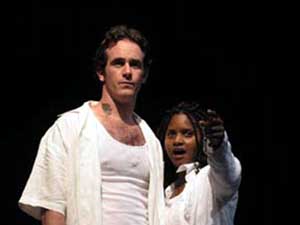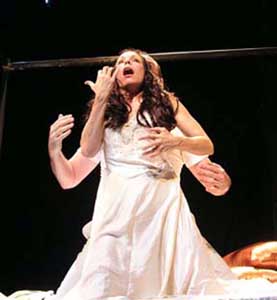-
- Something Special Food Pantry struggling
- APICAP celebrates 10 years
- Strides Against Breast Cancer at Balboa Park
- Dyke March to feature best entertainment lineup yet
- Bustamante fundraiser brings in over $15,000
- Stepping out with Stepping Stone
- Bourbon Street celebrates sweet 16
- First countywide GLBT senior needs assessment completed
- Community News
-
- AIDS patients, elderly, poor still waiting on state funding
- Weak needle exchange efforts leave CA addicts at risk
- Mother argues against parole for son’s killer
- Priest pleads no contest to enticing minor
- Congregation divided in wake of minister’s removal
- Schwarzenegger woos conservative convention delegates
- Older adults with HIV or AIDS benefit from telephone support
- In gay community, Miss America pageant is a major draw
- Conservative group to launch campaign against Bravo show
- National News Briefs
- World News Briefs
Arts & Entertainment
‘Phaedra in Delirium’
Published Thursday, 18-Sep-2003 in issue 821
Susan Yankowitz’s Phaedra in Delirium is a rhapsodic, poetic announcement about the problems of aging and the consequences of revealing silenced desire. Directed by the team of Kirsten Brandt and David Tierney, the play’s core storyline is pulled from the Greeks, most especially Euripides’ Hippolytus.
Robin Christ’s Phaedra is a choreographed dance of torment, but the playwright sets the stage with dreamlike sequences that resonate with the strong acting skills from the well-chosen and quite capable cast of four.
Phaedra laments the passing of her youth and is obsessed with watching her image in an oversized mirror that seems only to magnify the imperfections. Her erotic delirium about aging is juxtaposed with the equally obsessed Theseus (Ruff Yeager), her husband, who simply and unabashedly worships women. The raised upper stage even allows for an altar reserved for such worship.
Monique Gaffney plays the part of Phaedra’s friend (unnamed); she also serves as an intermediary between Hippolytus (David Standra) and Theseus. Her entrance is uniquely stylized in the first moments of the production, with a sensuous musical accompaniment of violin and guitar, falling rose petals, and the tactile coolness of water. Gaffney’s performance is well modulated, balancing the tensions within the household with caring for the family members, including Phaedra’s stepson, Hippolytus. Phaedra is possessed by a passion for her stepson, a passion that she is afraid to act upon. Still, her unbridled desire for this youth consumes her. Phaedra wallows in both the misery of her marriage to the womanizing Theseus and her unfulfilled longing for Hippolytus. She announces that she is “too old to suffer the petty griefs of love” and that at a certain age women suddenly become invisible. Aging, she says, is the fate every woman is trying to escape.
Hippolytus is the cold fish in this drama, an individual, as the text recites, with ice in his blood. He prefers communing with nature, unlike his middle-aged, virile father, who just can’t keep his zipper closed. Hippolytus seems much like a closeted gay, content to ride bareback on a four-legged mare until the more appropriate Greek therapy comes along. All four actors in this drama take Yankowitz’s words and make them their own. Their physicality and sensuous movements accentuate the frustrations inherent in the subtext of the play. The lighting by David Lee Cuthbert bathes the actors in a swath of yellow light that lends itself to the isolation of each character. Brandt and Tierney knew just what to do with Yankowitz’s Phaedra. It is a powerhouse of emotion that drives the point across to its audience until they say “ouch!” Phaedra in Delirium plays at St. Cecilia’s Playhouse through Oct. 11, running in repertory with Medea, Queen of Colchester. For more information, call (619) 544-1484.
|
|
Copyright © 2003-2025 Uptown Publications



